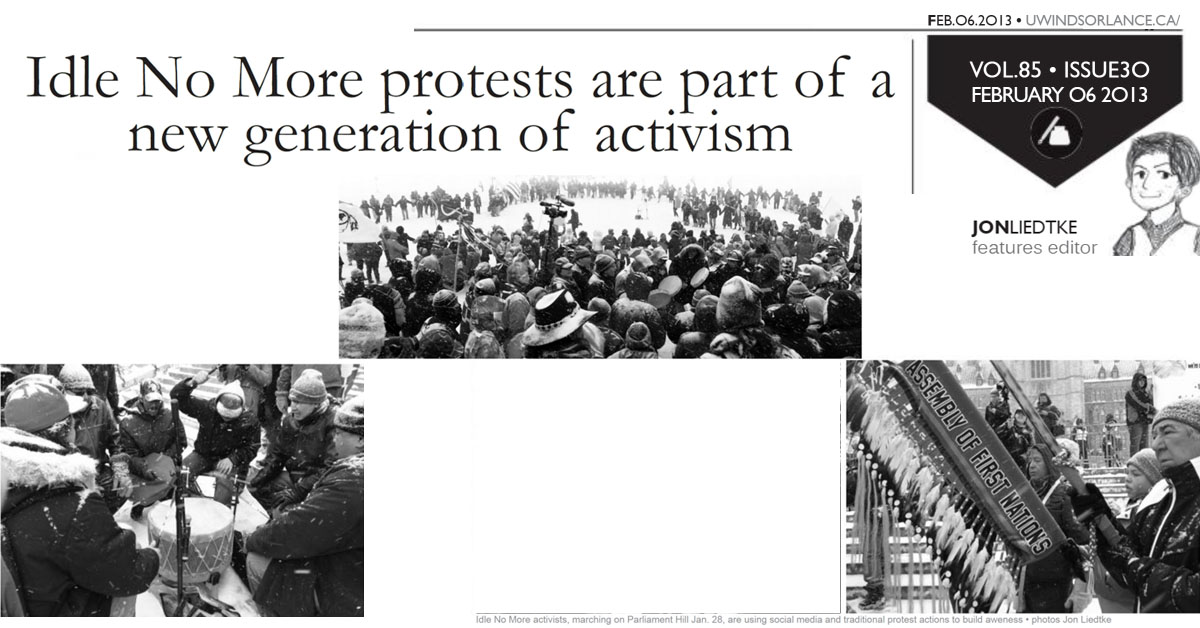UWindsor Lance
Issue 30, Volume 85
Feb 6, 2013
Jon Liedtke
A decentralized, grassroots and participant driven protest movement is gaining popularity worldwide
A new type of protest is taking hold on the world stage.
While policy makers, members of government and some residents cannot wrap their heads around a decentralized, grassroots and participant driven movement, it’s something that will undoubtedly resurface every few years as different segments of society realize that democracy enables them to actively protest.
Largely credited to the Arab Spring and Occupy Wall Street movements, where people dissatisfied with the rule of local governments took to massively decentralized street protests spread through social media, the new form of protest is gaining in popularity worldwide.
Closer to home, the decentralized primarily student-led street protests in Montreal regarding the cost of tuition were largely organized through social media. More recently, the Idle No More movement spread like wildfire across the country and the world alike.
Causing a recent economic blockade/slowdown of the Ambassador Bridge, Windsor members of Idle No More have gained national media attention,
and participant Lorena Shepley explained that the five actions organized in Windsor were to demonstrated support for the movement.
Shepley recently organized a chartered bus to transport roughly 50 to a rally at Parliament Hill on Jan. 28 for a national day of action. She took part because she opposed omnibus Bill C-45 which “made it so that our water [and land] is not protected. [The government has] not consulted with First Nations on treaty rights
which are affected by C-45 we suppolt the First Nations in asserting their sovereignty.”
Also supporting First Nations sovereignty is New Democratic Party Leader Tom Mulcair, who on Parliament Hill pledged that the ‘ ‘NDP will work on a nation-to-nation basis” with Aboriginals and that his claim was “a promise we will keep.”
Mulcair questioned how the federal conservative government under Stephen Harper could respect First Nations’ land and water rights while they destroyed the Navigable Waters Protection Act, and removed safeguards and environmental
assessments.
“You cannot destroy thousands of lakes and rivers and pretend to be respecting First Nations’ territorial fishing and hunting rights,” stated Mulcair to a chorus of applause and cheers.
Also pledging support to First Nations was NDP Member of Parliament Charlie Angus, who, in an Interview with The Lance, questioned, “Idle No More? These people have been patient long enough…they are Patient No More. We need change and we want to see it happen.”
“This is a wakeup call [to the government],” stated Angus. “It’s going to take a lot to wake Stephen Harper up and drag him out of bed and bring him into the 21st century but he’s going to come one way or another and we got to stay together, and stay positive and stay focused on moving ahead.”
Caleb Farrugia has taken part in over seven major protests at home and around the country.
“I’m not the most proud Canadian,” said Farrugia. “The most proud moments I have of being a Canadian are when I’m speaking my voice against the government when there’s something that needs to be said.”
Farrugia finds that most people don’t believe that protesting is a legitimate standard practice, but “in a democratic country, and many countries around the
world this is how a lot of change happens; through big movements.”
“People that speak their voices [are viewed] as outsiders not as patriots. I do it because I love where I’m from and the key is that I want to protect it,” said Farrugia.
Having been a part of the old traditional type of protest and the new leaderless form, Farrugia noted that while the media often misunderstands the new type of protest, and tends to delegitimize it, “they take as what they see as unorganized to
be poorly planned, when that’s not at all the case.”
“If there’s one person that is the face of a movement, it’s easy for the media to get their information and grasp it,” explained Farrugia. “When there are multiple groups and factions then it’s contusing to them since they tend to barely scratch the
surface of issues.”
Farrugia believes that the new type of protest is here to stay and that “for the first time, there’s a younger generation which has immense access to information” and “now with social media, it’s creating a new type of movement.”
While people undoubtedly paricipate in armchair activism— claiming to be an activist by spreading links via social media— Farrugia doesn’t discredit the practice. He said while the overall message is still being spread, “obviously what is still needed is people in the streets.”
“A movement like Idle No More is incredibly shocking to policy makers in this country,” stated Farmgia. “They pass bills and think that people won’t care because they’re apathetic…all of a sudden someone will start up a social media activist group and it’ll gain worldwide support, and they’re probably a little bit scared of that.”
Farrugia believes that government will be forced to reassess proposed legislation because while in the past, “if the media [wouldn’t] pay attention to the
situation,” now “at least the public can through social media. It’s our own private media.”
“There’s always going to be different demographics represented in mass protests, and whatever side you’re on, there’s always going to be people that agree with parts of what you say,” explained Farrugia, who confessed that at times this can be frustrating. “But people need to go there and speak for themselves. When you’re there, you’re representing yourself and your point of view, and that’s what makes Canada a beautiful country. Everyone here can have their own views we have a plurality of voices.”
Idle No More protests part of new eneration of activism
Issue 30, Volume 85
Feb 6, 2013
Jon Liedtke
Page 7
Jon Liedtke was the Features and Opinions Editor, Advertising Manager and Deficit Consultant at the UWindsor Lance.




Leave a Reply